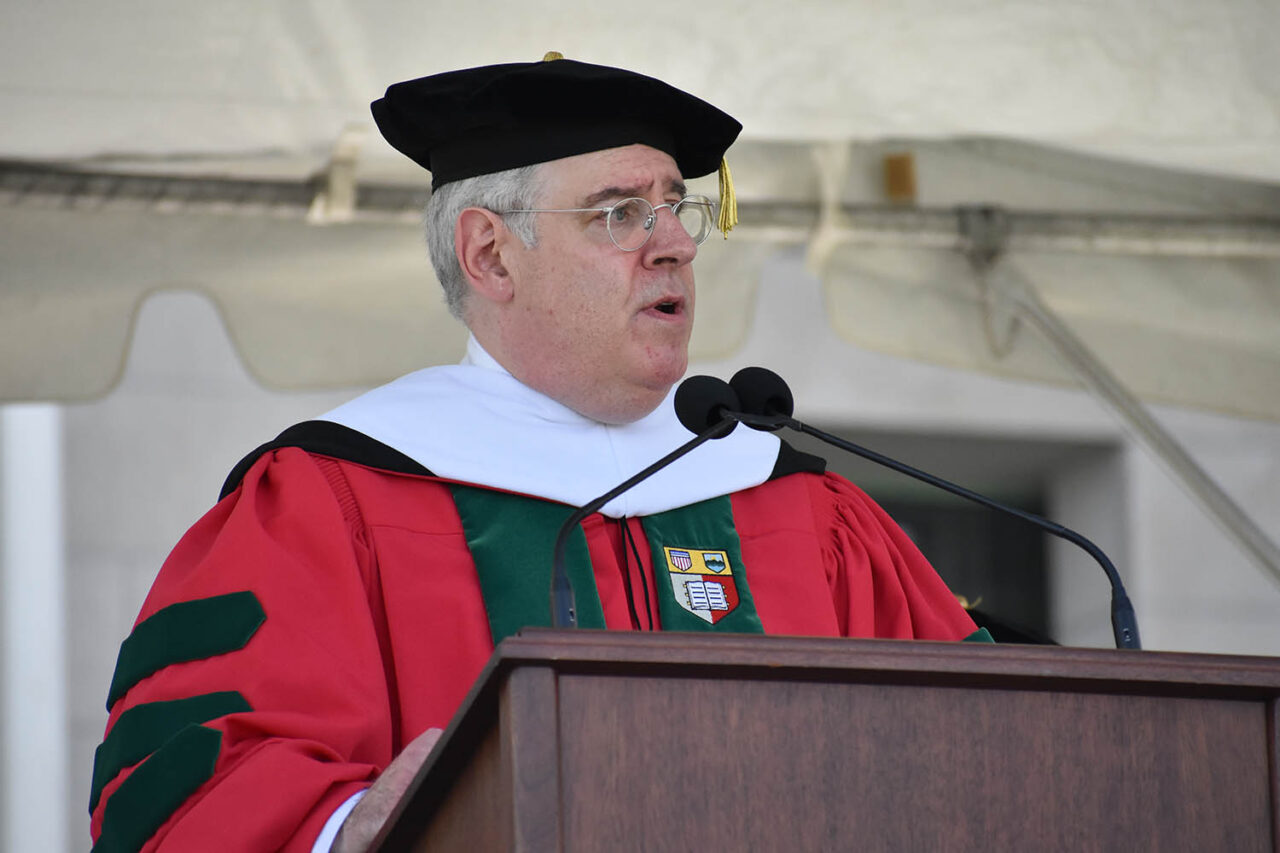Fins ’82: “The Humanities and Sciences are Better Together”

Dr. Joseph J. Fins ’82, honored at Wesleyan’s 190th Commencement as an Honorary Doctor of Humane Letters, has devoted his distinguished career to fostering a productive dialogue between the sciences and the humanities. As he explained in his speech to the Class of 2022, that dialogue began during his tenure at Wesleyan. “We favor the separation of church and state. But the separation of the sciences and the humanities: not so good. What’s the point of developing an mRNA vaccine for COVID-19 if we don’t understand the history and sociology of vaccine hesitancy? What better describes the power of illness to transform a life than Kafka’s The Metamorphosis? The humanities and sciences are better together,” Fins told the graduates.
Fins is an accomplished physician, bioethicist, academic, and a great champion of public health and the rights of people with brain injuries. He is the E. William Davis, Jr. MD Professor of Medical Ethics, professor of medicine, and chief of the Division of Medical Ethics at Weill Cornell Medical College. Fins is an attending physician and the director of medical ethics at New York-Presbyterian Weill Cornell Medical Center, on the adjunct faculty of Rockefeller University, and the Solomon Center Distinguished Scholar in Medicine, Bioethics, and the Law and a visiting professor of law at Yale Law School. Dr. Fins is the author of Rights Come to Mind: Brain Injury, Ethics and the Struggle for Consciousness (2015) and a co-author of the 2007 Nature paper describing the first use of deep brain stimulation in the minimally conscious state. He is a former chair of the Alumni Association and a trustee emeritus of Wesleyan.
Fins made the following remarks during Wesleyan’s 190th Commencement Ceremony on May 22:
Thank you so very much. President Roth, members of the faculty, board of trustees, distinguished guests…. My congratulations to my fellow honorees and to the awesome Class of 2022 from the Class of 1982!
A lot has changed since I’ve been here, but one constant is Church Street which is just behind us. On one side of the street is Olin Library on the other side the Science Library. It seemed to be a dividing line that separated the sciences and the humanities.
We favor the separation of Church and State. But the separation of the sciences and humanities: not so good. What’s the point of developing an mRNA vaccine for COVID-19 if we don’t understand the history and sociology of vaccine hesitancy? What better describes the power of illness to transform a life than Kafka’s The Metamorphosis? The humanities and the sciences are better together.
As a College of Letters major who was pre-med on the side—yeah it wasn’t easy—I used to enjoy crossing Church Street. It became a metaphor about bridging disciplines. I would study chemistry in Olin and read Joyce’s Ulysses in SciLi. I was always a little out of place by design, hoping to foster a conversation between the sciences and the humanities.
My dislocation as a student prefigured my career as a physician and bioethicist, addressing questions which required knowledge of both the sciences and the humanities.
My academic focus has been on our normative and legal obligations to those with severe brain injury. That problem space was brought to the fore by advances in neuroimaging which allow us to peer inside the injured brain and detect covert consciousness.
More recently, it was confronting the ethical challenges of inequity made so apparent by the COVID-19 pandemic.
These were novel problems. But Wesleyan prepared me because it has always been a place that fostered interdisciplinarity and encouraged me to cross Church Street.
So, I urge all of you to do the same. Cross your Church Street. Make new connections to address problems that cross disciplines. Apply your superb—and empowering—Wesleyan education to pressing challenges and make a difference in our all too troubled world.
President Roth has aptly described this as practical idealism, and that is what a Wesleyan education is all about.
I want to close by acknowledging the source of that practical idealism, the Wesleyan faculty behind us. They are our enduring font of wisdom, making Wesleyan such a special place from generation to generation. So, as I express my gratitude for this incredible honor, I want to honor Wesleyan faculty, then and now, who make it possible for us to go out into the world.
For me, it was the faculty of my beloved College of Letters, especially Paul Schwaber and the late Elisabeth Young-Bruehl, Antonio González from Romance Languages, and Anne Greene, who’s on the podium, who became a literary mentor after I graduated.
Each of you have your own honor roll of Wesleyan faculty. Thank them and remember them with gratitude as you remember your alma mater in the years ahead. Congratulations to the Class of 2022!

